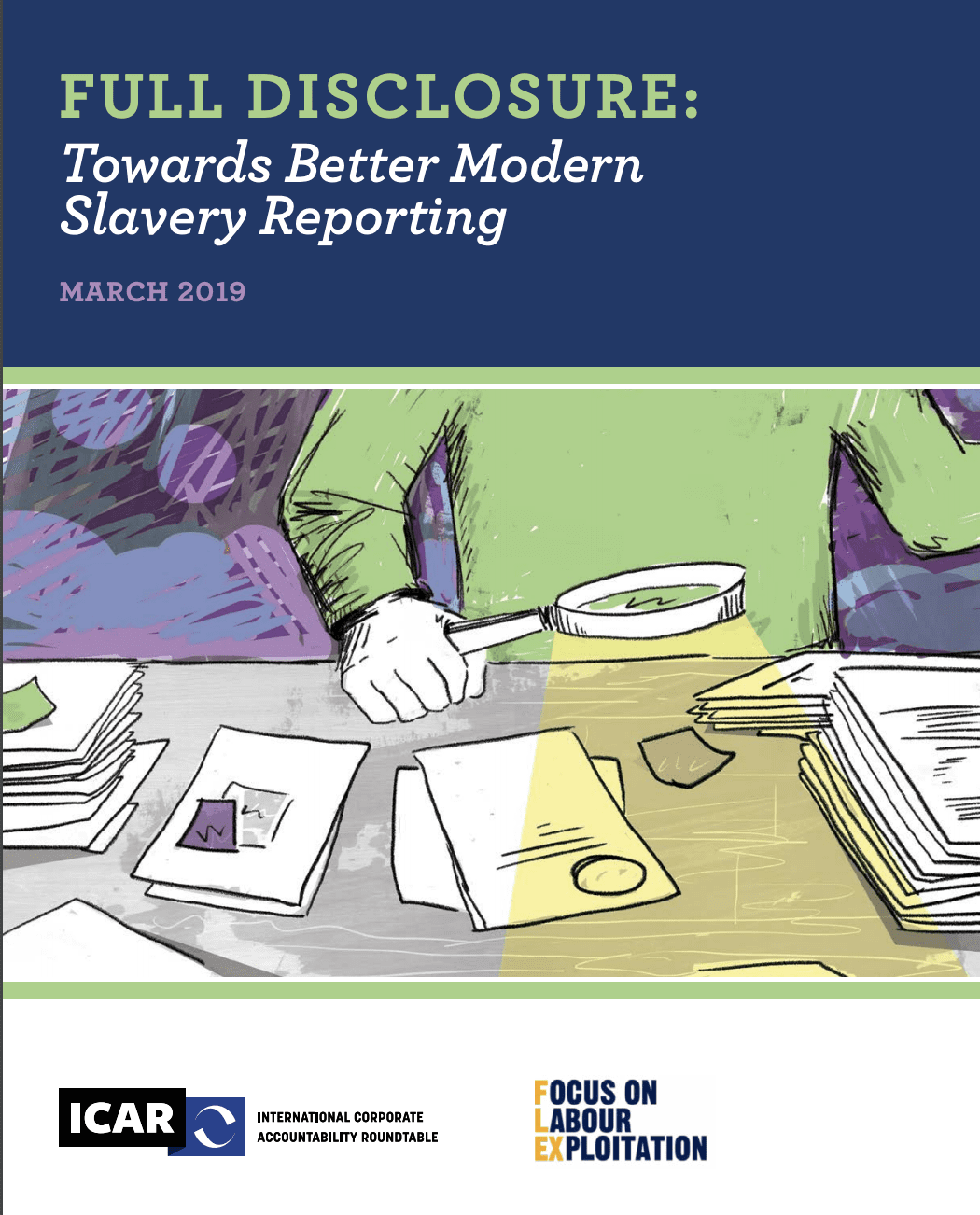
Full Disclosure: Towards Better Modern Slavery Reporting
Executive Summary
Corporate human rights reporting is a commonly expected practice and is increasingly becoming a legal requirement for businesses. Under the international framework of the United Nations Guiding Principles on Business and Human Rights (UNGPs), states should “encourage, and where appropriate require, business enterprises to communicate how they address their human rights impacts.”1 In the past few years, several countries have passed laws that mandate companies disclose their policies and practices aimed specifically at preventing forced labor and human trafficking in their supply chains. The first such disclosure law, the Transparency in Supply Chains Act, was passed in California in 2010. In 2015, the United Kingdom passed the Modern Slavery Act (U.K. MSA), a comprehensive law that seeks to eradicate modern slavery and includes a transparency provision for businesses that improves upon the base model laid out in the California Act. The Australian government passed a modern slavery law in December of 2018, and similar bills have also been introduced in Canada and the United States. Other jurisdictions have passed or are exploring legislation mandating that companies conduct human rights due diligence and report on such efforts. In this context, it is crucial to assess how effective modern slavery transparency legislation has been, as well as to identify ways to ensure reporting practices have the intended impact.
At their core, these laws have tried to improve corporate reporting and business practices that could increase the risks of forced labor. Examining the record after several years since their passage, the results overall are disappointing. The laws appear to have had some positive outcomes, including increased awareness of the problem of forced labor and human trafficking in global supply chains, notably among company executives. This increased awareness has led some companies to allocate more resources to tackling these issues. Company reporting has also improved access to corporate information and strengthened the ability of external stakeholders to provide guidance to companies as well as to measure company performance on these issues year-on-year.
However, existing reporting requirements have failed to achieve their core aim: to induce businesses to meaningfully address and adequately report on their efforts to tackle forced labor and human trafficking in their supply chains. Our research has shown that compliance with these laws has been inconsistent, and that the breadth and quality of information companies disclose is insufficient and does not reflect serious efforts to tackle the problem. Additionally, the information included in modern slavery statements has not been adequate to enable civil society to effectively monitor company performance nor engage meaningfully with them. Reporting is meaningful only when companies have taken effective action to identify, prevent, mitigate, and address the human rights impacts of their business activities and when these actions result in tangible improvements to rights-holders. This can only be achieved if reporting is outcomes-oriented and based on identifying concrete risks of forced labor and human trafficking within corporate supply chains.
Through analysis of company statements, engagement with stakeholders, and deskbased research, we have identified the key provisions in existing modern slavery reporting laws that appear to have had an impact on corporate practices, including requiring companies to publish their statements on the homepage of their websites with a clearly visible link on the home page; requiring board or executive level sign off on any such statements; and requiring governments to establish independent bodies to provide guidance for companies and review company statements. We have also identified gaps in existing legislation that should be improved upon in new laws or through amendments to existing statutes, including broadening the scope of applicability to include a greater range of companies; establishing mandatory reporting criteria and thorough guidance in collaboration with stakeholders, including CSOs, trade unions, investors and companies; introducing better monitoring and enforcement mechanisms; and developing incentives to encourage practices that go above and beyond the legal requirements. Ultimately, mandatory human rights due diligence that includes liability is increasingly being recognised by activists, CSOs, trade unions, and progressively by legislatures and some governments as more effective in preventing forced labor, as well as other human rights abuses, in supply chains. A full list of our recommendations can be found in the conclusion.
Read more here.
